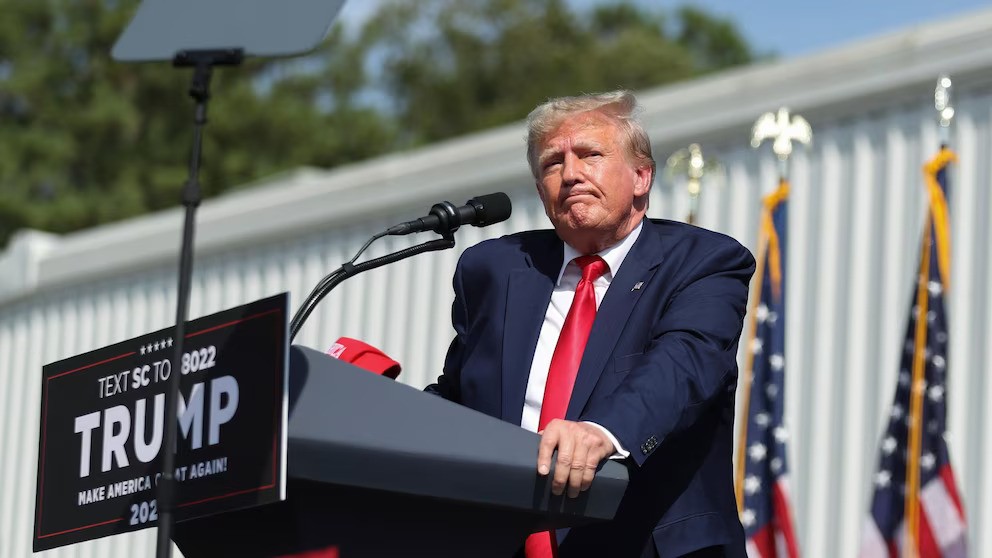In a high-intensity legal standoff, which has captivated the nation’s attention, lawyers for former President Donald Trump are accusing Special Counsel Jack Smith of attempting to ‘muzzle’ their client with a gag order request.
“At bottom, the Proposed Gag Order is nothing more than an obvious attempt by the Biden administration to unlawfully silence its most prominent political opponent, who has now taken a commanding lead in the polls,” Trump’s lawyer Gregory Singer stated.
This unprecedented move has ignited a potentially explosive legal battle, sparking intense debates about freedom of speech, the role of special counsels, and the sanctity of the judicial process.
Trump Fights Jack Smith: Lawyers Challenge the Gag Order Request
The legal team representing Donald Trump has vehemently opposed the gag order request. They assert that it infringes upon the former president’s First Amendment rights, arguing that such an order could set a dangerous precedent.
“Following these efforts to poison President Trump’s defense, the prosecution now asks the court to take the extraordinary step of stripping President Trump of his First Amendment freedoms during the most important months of his campaign against President Biden,” lawyers for the former president said.
“The court should reject this transparent gamesmanship and deny the motion entirely.”
They warn that it has the potential to stifle political discourse, undermine constitutional rights, and even alter the landscape of future legal disputes involving public figures. The legal team is urging the court to reject this request, setting the stage for a clash that could have far-reaching implications for both the legal and political realms.
On the other side of the aisle, Special Counsel Jack Smith’s request for a gag order is not without its own compelling set of arguments. Prosecutors have expressed serious concerns about Trump’s potential influence on possible witnesses and jury members. They argue that Trump’s public commentary on the case could disrupt the proceedings, bias potential jurors, and ultimately undermine the pursuit of justice.
The Implications of the Gag Order Request
This tug-of-war between the legal teams raises questions about the balance between freedom of speech and the integrity of the judicial process. If the court grants the gag order request, it could set a new precedent for how public figures can comment on ongoing legal cases. On the other hand, denying the request could validate concerns about potential interference in the judicial process.
The public reaction to this legal standoff has been polarized. Some see the gag order request as a necessary measure to ensure fair proceedings, while others view it as an infringement on Trump’s First Amendment rights. The case has also sent shockwaves through the political landscape, as politicians, pundits, and the public alike grapple with its potential ramifications.
This case could set a precedent for future legal disputes involving public figures. It raises questions about the extent to which public figures can comment on legal proceedings without jeopardizing the integrity of these proceedings. This case could provide answers to these questions, shaping the way public figures interact with the legal system in the future.
The ongoing legal battle also brings into sharp focus several constitutional questions. The outcome could influence how the First Amendment is interpreted in the context of public figures commenting on ongoing legal cases. It could also shape the role of special counsels in such cases.
The media coverage of the case has played a significant role in shaping public perception. Different media outlets have presented varying perspectives on the case, contributing to the divided public opinion.
The judiciary’s handling of this high-profile case will be closely watched. The court’s decision could influence public trust in the judicial system and its perceived impartiality.
As the legal battle unfolds, the nation watches with bated breath. The outcome of this case could redefine the relationship between public discourse and legal proceedings, potentially altering the landscape of American politics and jurisprudence.
Regardless of the result, this case underscores the ongoing tension between the need for a transparent legal process and the protection of constitutional freedoms. In the end, the resolution of this conflict will not only impact Donald Trump but could also set the stage for future legal battles involving public figures. It will be interesting to see how this unfolds.
For more of our coverage of Donald Trump’s legal battles, make sure to check out our Trump section.




